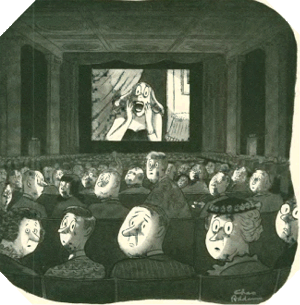Bizet's widow of three years at 29
|
"That's my last Duchess painted on the wall,
Looking as if she were alive. I call
That piece a wonder, now: Fra Pandolf’s hands
Worked busily a day, and there she stands.
Will’t please you sit and look at her? I said
“Fra Pandolf” by design, for never read
Strangers like you that pictured countenance,
The depth and passion of its earnest glance,
But to myself They turned (since none puts by
The curtain I have drawn for you, but I)
And seemed as they would ask me, if they durst,
How such a glance came there; so, not the first
Are you to turn and ask thus".
... Robert Browning (1812-89), English Poet
A woman, clothed in black, sits in a high-back wooden chair. She stares directly in front of her somewhat insecure it seems as suggested particularly by her hands. Her left hand positioned in her lap appears nervously rigid, while the other lays a tad awkward on the chair's arm rest. This remarkable portrait by Jules-Élie Delaunay (1828-91) is of Geneviève Halévy (1849-1926), later Geneviève Bizet and Geneviève Straus. She was to become a French salonniere of some notoriety. She inspired Marcel Proust (1871-1922) as a model for the Duchesse de Guermantes in A la recherche du temps perdu.
Looking as if she were alive. I call
That piece a wonder, now: Fra Pandolf’s hands
Worked busily a day, and there she stands.
Will’t please you sit and look at her? I said
“Fra Pandolf” by design, for never read
Strangers like you that pictured countenance,
The depth and passion of its earnest glance,
But to myself They turned (since none puts by
The curtain I have drawn for you, but I)
And seemed as they would ask me, if they durst,
How such a glance came there; so, not the first
Are you to turn and ask thus".
... Robert Browning (1812-89), English Poet
A woman, clothed in black, sits in a high-back wooden chair. She stares directly in front of her somewhat insecure it seems as suggested particularly by her hands. Her left hand positioned in her lap appears nervously rigid, while the other lays a tad awkward on the chair's arm rest. This remarkable portrait by Jules-Élie Delaunay (1828-91) is of Geneviève Halévy (1849-1926), later Geneviève Bizet and Geneviève Straus. She was to become a French salonniere of some notoriety. She inspired Marcel Proust (1871-1922) as a model for the Duchesse de Guermantes in A la recherche du temps perdu.
Madame Halevy´s main claim to fame was as the wife of Georges Bizet (1838-75), a famous French composer, mainly of operas (notably Carmen). She is pictured here at 29, his widow of three years, after barely six years of marriage with one son. But what tumultuous years those were!
Carmen
|
This was a time of massive social upheaval in Paris where the couple had decided to live, just on the heels of the French Revolution which precipitated into terror and then Napoleonic despotism preparing the way for the pan-European revolutions of 1848. These were short-lived but they ushered in the Paris Commune, an epochal experiment in socialist government that briefly ruled Paris in 1871. Even though it lasted only a few months and thousands of socialist enthusiasts lost their lives in a brutal supression by federal imperialist forces, it did establish an important planning framework for Lenin in the October revolution of 1917. And in the midst of this chaos in Paris emerged Bizet's Carmen, now one of the most frequently performed operas in the world.











.jpg)











